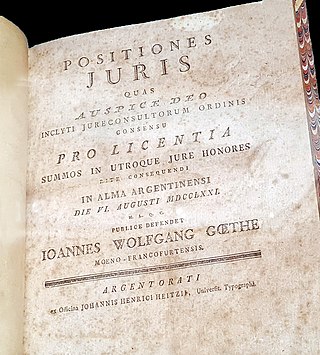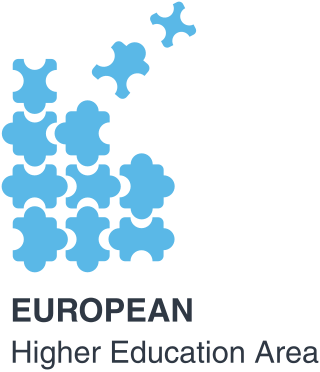
Tertiary education, also referred to as third-level, third-stage or post-secondary education, is the educational level following the completion of secondary education. The World Bank, for example, defines tertiary education as including universities as well as trade schools and colleges. Higher education is taken to include undergraduate and postgraduate education, while vocational education beyond secondary education is known as further education in the United Kingdom, or included under the category of continuing education in the United States.
An academic degree is a qualification awarded to a student upon successful completion of a course of study in higher education, usually at a college or university. These institutions often offer degrees at various levels, usually divided into undergraduate and postgraduate degrees. The most common undergraduate degree is the bachelor's degree, although some educational systems offer lower-level undergraduate degrees such as associate and foundation degrees. Common postgraduate degrees include engineer's degrees, master's degrees and doctorates.

The Bologna Process is a series of ministerial meetings and agreements between European countries to ensure comparability in the standards and quality of higher-education qualifications. The process has created the European Higher Education Area under the Lisbon Recognition Convention. It is named after the University of Bologna, where the Bologna declaration was signed by education ministers from 29 European countries in 1999. The process was opened to other countries in the European Cultural Convention of the Council of Europe, and government meetings have been held in Prague (2001), Berlin (2003), Bergen (2005), London (2007), Leuven (2009), Budapest-Vienna (2010), Bucharest (2012), Yerevan (2015), Paris (2018), and Rome (2020).

An engineering technologist is a professional trained in certain aspects of development and implementation of a respective area of technology. An education in engineering technology concentrates more on application and less on theory than does an engineering education. Engineering technologists often assist engineers; but after years of experience, they can also become engineers. Like engineers, areas where engineering technologists can work include product design, fabrication, and testing. Engineering technologists sometimes rise to senior management positions in industry or become entrepreneurs.
A diploma mill or degree mill is a business that sells illegitimate diplomas or academic degrees. The term diploma mill is also used pejoratively to describe any educational institution with low standards for admission and graduation, low job placement rate, or low average starting salaries of its graduates.

A licentiate is an academic degree present in many countries, representing different educational levels. It may be similar to a master's degree when issued by pontifical universities and other universities in Europe, Latin America, and Syria.

The European Higher Education Area (EHEA) was launched in March 2010, during the Budapest-Vienna Ministerial Conference, on the occasion of the 10th anniversary of the Bologna Process.
The Lisbon Recognition Convention, officially the Convention on the Recognition of Qualifications concerning Higher Education in the European Region, is an international convention of the Council of Europe elaborated together with the UNESCO. This is the main legal agreement on credential evaluation in Europe.
An engineer's degree is an advanced academic degree in engineering which is conferred in Europe, some countries of Latin America, North Africa and a few institutions in the United States. The degree may require a thesis but always requires a non-abstract project.
In education, a transcript is a certified record (inventory) of a student throughout a course of study having full enrollment history including all courses attempted, grades earned and degrees and awards conferred.
A Diplom is an academic degree in the German-speaking countries Germany, Austria, and Switzerland and a similarly named degree in some other European countries including Albania, Bulgaria, Belarus, Bosnia and Herzegovina, Croatia, Estonia, Finland, Poland, Russia, and Ukraine and only for engineers in France, Greece, Hungary, North Macedonia, Romania, Serbia, Slovenia, and Brazil.
The European Students' Union (ESU) is the umbrella organisation of 44 national unions of students from 40 countries, representing almost 20 million students. A consultative member of the Bologna Process, ESU is also a full member of the European Youth Forum (YFJ).
Education in Armenia is held in particular esteem in Armenian culture. Education developed the fastest out of the social services, while health and welfare services attempted to maintain the basic state-planned structure of the Soviet era, following Armenia's independence in 1991. Today, Armenia is trying to implement a new vision for its higher education system while pursuing the goals of the European Higher Education Area. The Ministry of Education and Science oversees education in the country.
Higher education in Portugal is divided into two main subsystems: university and polytechnic education. It is provided in autonomous public and private universities, university institutes, polytechnic institutes and higher education institutions of other types.

Education in Moldova is currently the responsibility of the Ministry of Education, Culture and Research.
The Validation or recognition of foreign studies and degrees is the process whereby a competent authority in one country formally recognises the value of a qualification from a foreign country. This can entail total or partial validation of foreign university and non-university studies, degrees and other qualifications. Particularly within Europe, this is covered by a number of international conventions and agreements.

Education in Azerbaijan is regulated by the Ministry of Education of Azerbaijan.
The Technological Educational Institute (TEI) of Central Greece was a university founded in 2013, had a main campus 15.81 acres (0.0640 km2) in the City of Lamia, Phthiotis, Central Greece, and four branch campuses. An institution of higher education of the State University System of Greece, having full self governance and functions under the supervision of the Ministry of Education, laws 2916 on 11-6-2001 and 3549 on 20-3-2007. The Technological Institute of Central Greece has abolished on 29 January 2019 and ceased to be a university in its own name status by an Act of Hellenic Parliament, Law 4589/29-1-2019. Educational departments absorbed by the Agricultural University of Athens (AUA), National and Kapodistrian University of Athens (NKUA), University of Thessaly (UTH).

The Faculty of Biotechnical Sciences is a public higher education and research institution in the area of biotechnical sciences, located in Bitola, Republic of Macedonia. It was established in 1999 and provides education up to doctoral level. Many of its graduates enter the food industry.







